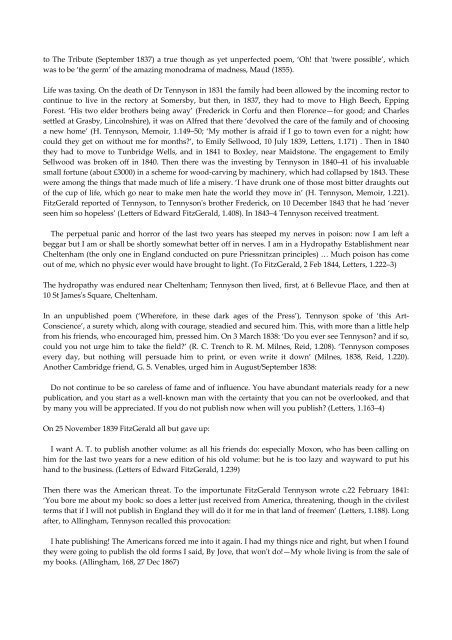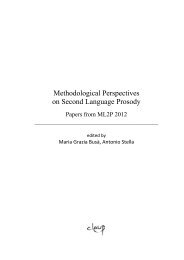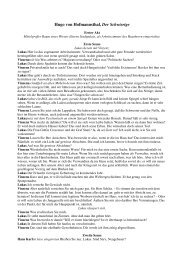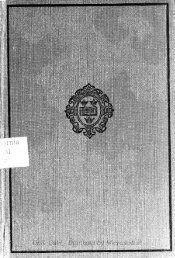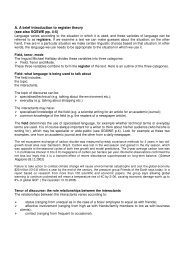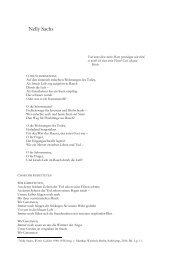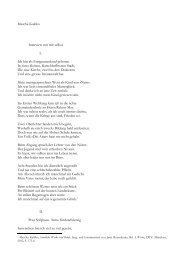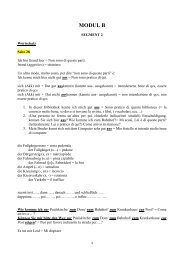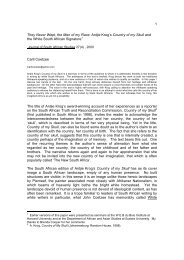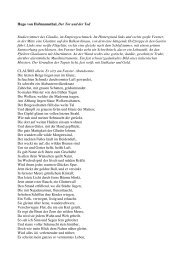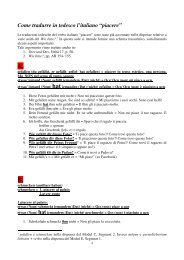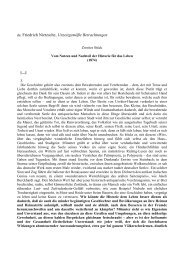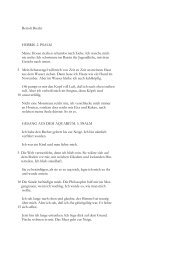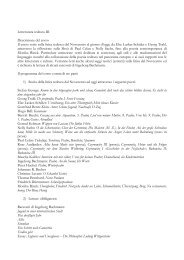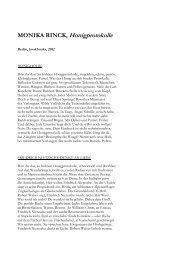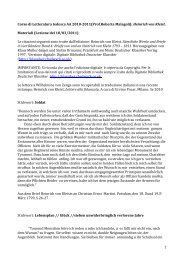The lives of the poets from The Dictionary of National Biography ...
The lives of the poets from The Dictionary of National Biography ...
The lives of the poets from The Dictionary of National Biography ...
You also want an ePaper? Increase the reach of your titles
YUMPU automatically turns print PDFs into web optimized ePapers that Google loves.
to <strong>The</strong> Tribute (September 1837) a true though as yet unperfected poem, ‘Oh! that ʹtwere possible’, which<br />
was to be ‘<strong>the</strong> germ’ <strong>of</strong> <strong>the</strong> amazing monodrama <strong>of</strong> madness, Maud (1855).<br />
Life was taxing. On <strong>the</strong> death <strong>of</strong> Dr Tennyson in 1831 <strong>the</strong> family had been allowed by <strong>the</strong> incoming rector to<br />
continue to live in <strong>the</strong> rectory at Somersby, but <strong>the</strong>n, in 1837, <strong>the</strong>y had to move to High Beech, Epping<br />
Forest. ‘His two elder bro<strong>the</strong>rs being away’ (Frederick in Corfu and <strong>the</strong>n Florence—for good; and Charles<br />
settled at Grasby, Lincolnshire), it was on Alfred that <strong>the</strong>re ‘devolved <strong>the</strong> care <strong>of</strong> <strong>the</strong> family and <strong>of</strong> choosing<br />
a new home’ (H. Tennyson, Memoir, 1.149–50; ‘My mo<strong>the</strong>r is afraid if I go to town even for a night; how<br />
could <strong>the</strong>y get on without me for months?’, to Emily Sellwood, 10 July 1839, Letters, 1.171) . <strong>The</strong>n in 1840<br />
<strong>the</strong>y had to move to Tunbridge Wells, and in 1841 to Boxley, near Maidstone. <strong>The</strong> engagement to Emily<br />
Sellwood was broken <strong>of</strong>f in 1840. <strong>The</strong>n <strong>the</strong>re was <strong>the</strong> investing by Tennyson in 1840–41 <strong>of</strong> his invaluable<br />
small fortune (about £3000) in a scheme for wood‐carving by machinery, which had collapsed by 1843. <strong>The</strong>se<br />
were among <strong>the</strong> things that made much <strong>of</strong> life a misery. ‘I have drunk one <strong>of</strong> those most bitter draughts out<br />
<strong>of</strong> <strong>the</strong> cup <strong>of</strong> life, which go near to make men hate <strong>the</strong> world <strong>the</strong>y move in’ (H. Tennyson, Memoir, 1.221).<br />
FitzGerald reported <strong>of</strong> Tennyson, to Tennysonʹs bro<strong>the</strong>r Frederick, on 10 December 1843 that he had ‘never<br />
seen him so hopeless’ (Letters <strong>of</strong> Edward FitzGerald, 1.408). In 1843–4 Tennyson received treatment.<br />
<strong>The</strong> perpetual panic and horror <strong>of</strong> <strong>the</strong> last two years has steeped my nerves in poison: now I am left a<br />
beggar but I am or shall be shortly somewhat better <strong>of</strong>f in nerves. I am in a Hydropathy Establishment near<br />
Cheltenham (<strong>the</strong> only one in England conducted on pure Priessnitzan principles) … Much poison has come<br />
out <strong>of</strong> me, which no physic ever would have brought to light. (To FitzGerald, 2 Feb 1844, Letters, 1.222–3)<br />
<strong>The</strong> hydropathy was endured near Cheltenham; Tennyson <strong>the</strong>n lived, first, at 6 Bellevue Place, and <strong>the</strong>n at<br />
10 St Jamesʹs Square, Cheltenham.<br />
In an unpublished poem (‘Wherefore, in <strong>the</strong>se dark ages <strong>of</strong> <strong>the</strong> Press’), Tennyson spoke <strong>of</strong> ‘this Art‐<br />
Conscience’, a surety which, along with courage, steadied and secured him. This, with more than a little help<br />
<strong>from</strong> his friends, who encouraged him, pressed him. On 3 March 1838: ‘Do you ever see Tennyson? and if so,<br />
could you not urge him to take <strong>the</strong> field?’ (R. C. Trench to R. M. Milnes, Reid, 1.208). ‘Tennyson composes<br />
every day, but nothing will persuade him to print, or even write it down’ (Milnes, 1838, Reid, 1.220).<br />
Ano<strong>the</strong>r Cambridge friend, G. S. Venables, urged him in August/September 1838:<br />
Do not continue to be so careless <strong>of</strong> fame and <strong>of</strong> influence. You have abundant materials ready for a new<br />
publication, and you start as a well‐known man with <strong>the</strong> certainty that you can not be overlooked, and that<br />
by many you will be appreciated. If you do not publish now when will you publish? (Letters, 1.163–4)<br />
On 25 November 1839 FitzGerald all but gave up:<br />
I want A. T. to publish ano<strong>the</strong>r volume: as all his friends do: especially Moxon, who has been calling on<br />
him for <strong>the</strong> last two years for a new edition <strong>of</strong> his old volume: but he is too lazy and wayward to put his<br />
hand to <strong>the</strong> business. (Letters <strong>of</strong> Edward FitzGerald, 1.239)<br />
<strong>The</strong>n <strong>the</strong>re was <strong>the</strong> American threat. To <strong>the</strong> importunate FitzGerald Tennyson wrote c.22 February 1841:<br />
‘You bore me about my book: so does a letter just received <strong>from</strong> America, threatening, though in <strong>the</strong> civilest<br />
terms that if I will not publish in England <strong>the</strong>y will do it for me in that land <strong>of</strong> freemen’ (Letters, 1.188). Long<br />
after, to Allingham, Tennyson recalled this provocation:<br />
I hate publishing! <strong>The</strong> Americans forced me into it again. I had my things nice and right, but when I found<br />
<strong>the</strong>y were going to publish <strong>the</strong> old forms I said, By Jove, that wonʹt do!—My whole living is <strong>from</strong> <strong>the</strong> sale <strong>of</strong><br />
my books. (Allingham, 168, 27 Dec 1867)


